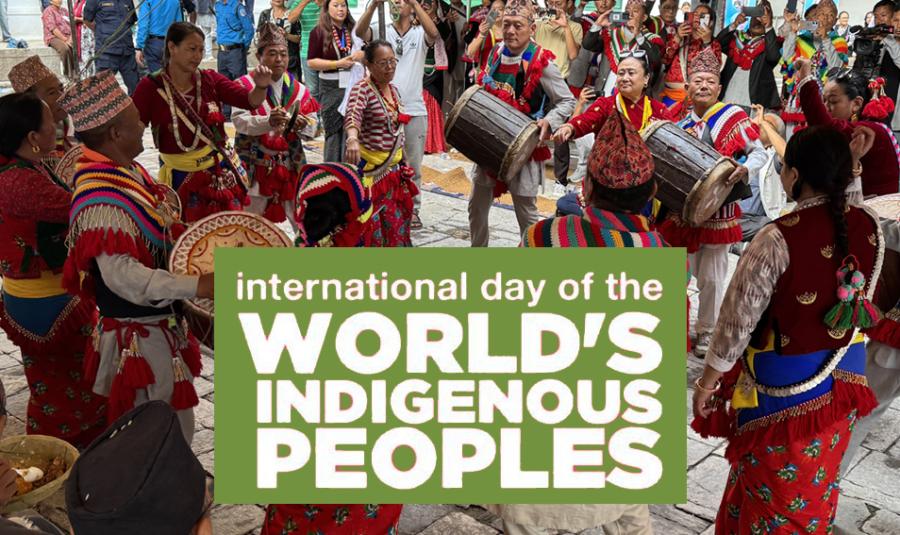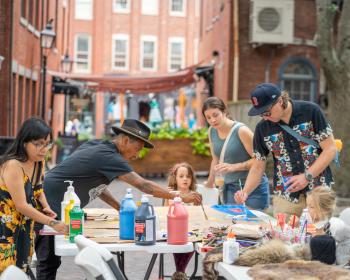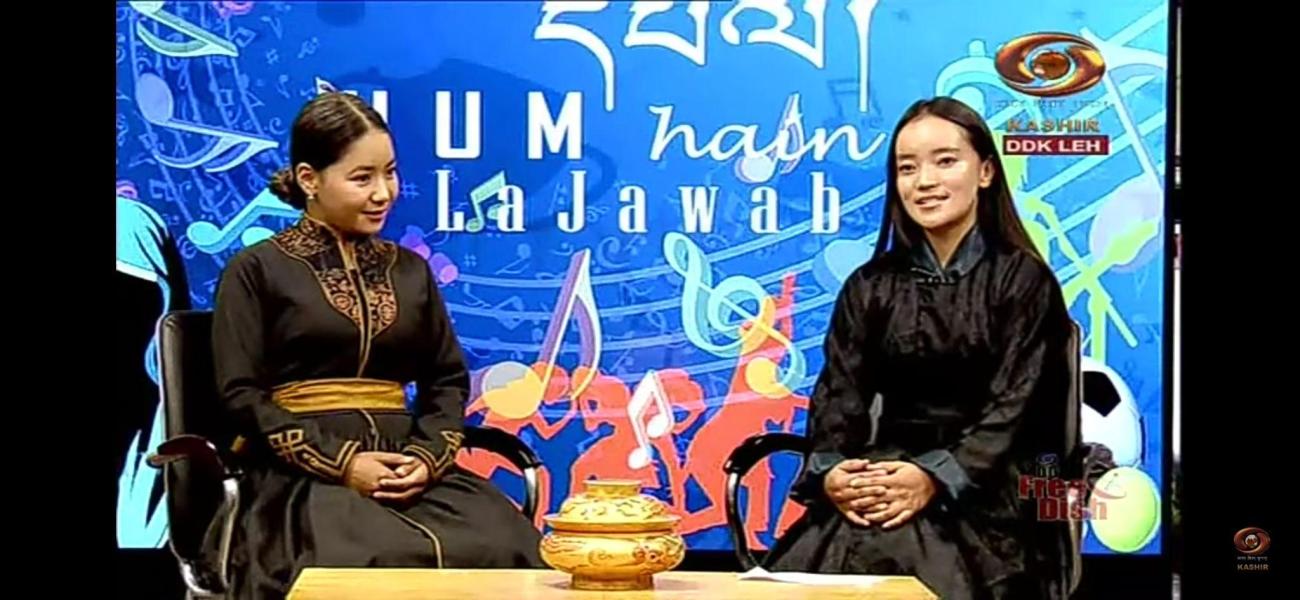
Photo: Fellow Ishey Angmo (Ladakhi) interviewing Tsering Lhamo (Ladakhi), National School of Drama teacher, broadcasted on Doordarshen News.
The creative spirits of Cultural Survival’s Indigenous Youth Fellows continue to flourish through their community media projects. As part of the Indigenous Community Media Youth Fellowship, fellows have opportunities to enhance, strengthen, and build on their skills and creativity in regenerating, recovering, and revitalizing their cultural identities, traditions, languages, and knowledge systems to safeguard the kinship of their ancestors with Mother Earth. Community radio and social media has long reached communities as a means of communication, however, accurate representation of Indigenous Peoples in mainstream media is still lacking. Learn how our Fellows have been utilizing media in uplifting and amplifying Indigenous voices. They have become leaders in their communities by producing media content for their people, combatting discrimination and stereotypes projected by mainstream media, and building solidarity among Indigenous Peoples through their struggles and resistance.
Ishey Angmo (Ladakhi) from North India
Ishey Angmo (Ladakhi), 24, s fellowship project, “Youth Empowerment through Media to Protect Indigenous Culture, Tradition, and Land,” where she continues to expand her experience in journalism, media, and radio. She recently completed an internship with a local news channel, Doordarshen News, in Leh, where she learned about and gained practical skills in the mechanics of news broadcasting. As part of her fellowship, she will continue doing site visits to radio and television stations to enhance her knowledge. She will also be sharing her experience with youth in the Students’ Educational and Cultural Movement of Ladakh (SECMOL) through capacity-building workshops.
During her internship with Doordarshen News, Ishey interviewed someone from Ladakh, a major first-time on-air experience for her. She also learned about how to present news and learned the difference between privatized and government-owned media and how its censored and does not take into account the real struggles of Ladakh Peoples, and how policies limit the participation of younger generations in news broadcasting because it is outdated. Ishey dreams of having a local community-based news channel for the Indigenous community where they can speak their truth in their own languages. She recognizes the importance of freedom of expression and the value of community radio. She believes community media plays a crucial role in educating and mobilizing Ladakh Peoples in securing the wellbeing of future generations.
Check out Ishey´s broadcast here.
Indigenous Women’s Circle of Words-MLK (Pijao, Embera, Inga, Pastos) from Colombia
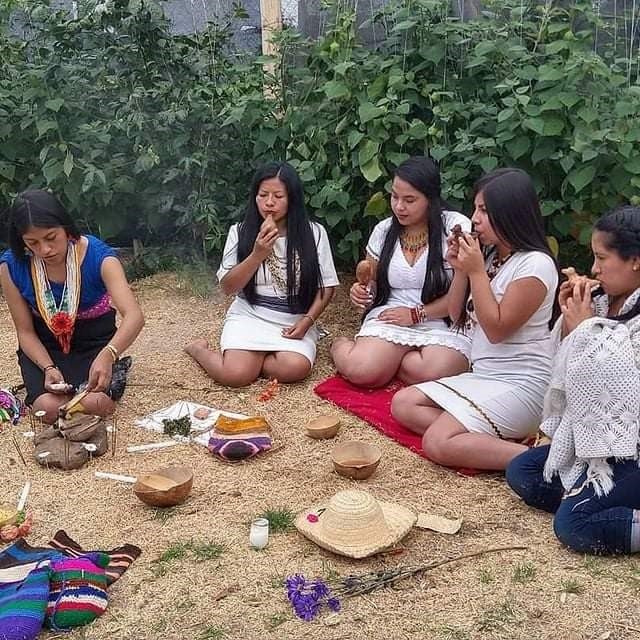
Members of Women´s Circle of Words-MLK participating in a musical ritual. Courtesy photo by Women´s Circle of Words-MLK.
Indigenous Women’s Circle of Words-MLK is an interdisciplinary group of Indigenous women from Colombia interested in promoting the knowledge and practices of Indigenous communities from different areas. Members have shown interest in community well-being and are participating in different political, social, and cultural movements to document the challenges of their communities as well as their cultural richness.
Andrea (Pijao), Mayra (Embera), Daniela (Pastos), and Paola (Inga) have been actively gathering content for their project, “Voices of Our Land,'' which will highlight the wisdom, knowledge, and voices of five Indigenous communities in Colombia. The group has completed research with the Embera Peoples in Riosocuio, Caldas, and Narayen Pastures in the southern pastures of Colombia. Through their exploration, they have built strong bonds with families who they have interviewed about anecdotes and stories of the land and culture.
As a group of Indigenous women who work to make their communities visible, Indigenous Women’s Circle of Words-MLK seek other women to join their efforts, starting from the daily life of communities and their harmonious relationship with the environment, human beings, animals, elements, where the balance between the feminine and masculine is mutual to the principles of Sumak Kawsay. Sumak Kawsay represents good living and highlights the role of care and the recognition of women in different spaces inside and outside the communities because oftentimes many of the women are invisible. Through their fellowship, the stories of five Indigenous communities in Colombia are being amplified through multimedia formats. The testimonies are a resource for future initiatives within the communities in revitalizing their traditions, cultures, and knowledge. Indigenous Women’s Circle of Words-MLK collaborates with a rural education study group at National Pedagogical University and will be broadcasting their productions on a radio program "Walking Our Territories" dedicated to Indigenous communities and Indigenous knowledge.
Follow The Circle of Word of Indigenous Women-MLK on social media:
Instagram, Facebook, and radio programs 528 years of Indigenous resistance, program #20, the launch of the segment "Walking Our territories."

Members of Women´s Circle of Words-MLK preparing materials for a ceremony. Courtesy photo by Women´s Circle of Words-MLK.
Angy Paola Conde Conchave (Embera Dovida) and Jhon Andres Duave Serezo (Embera Katio) from Colombia
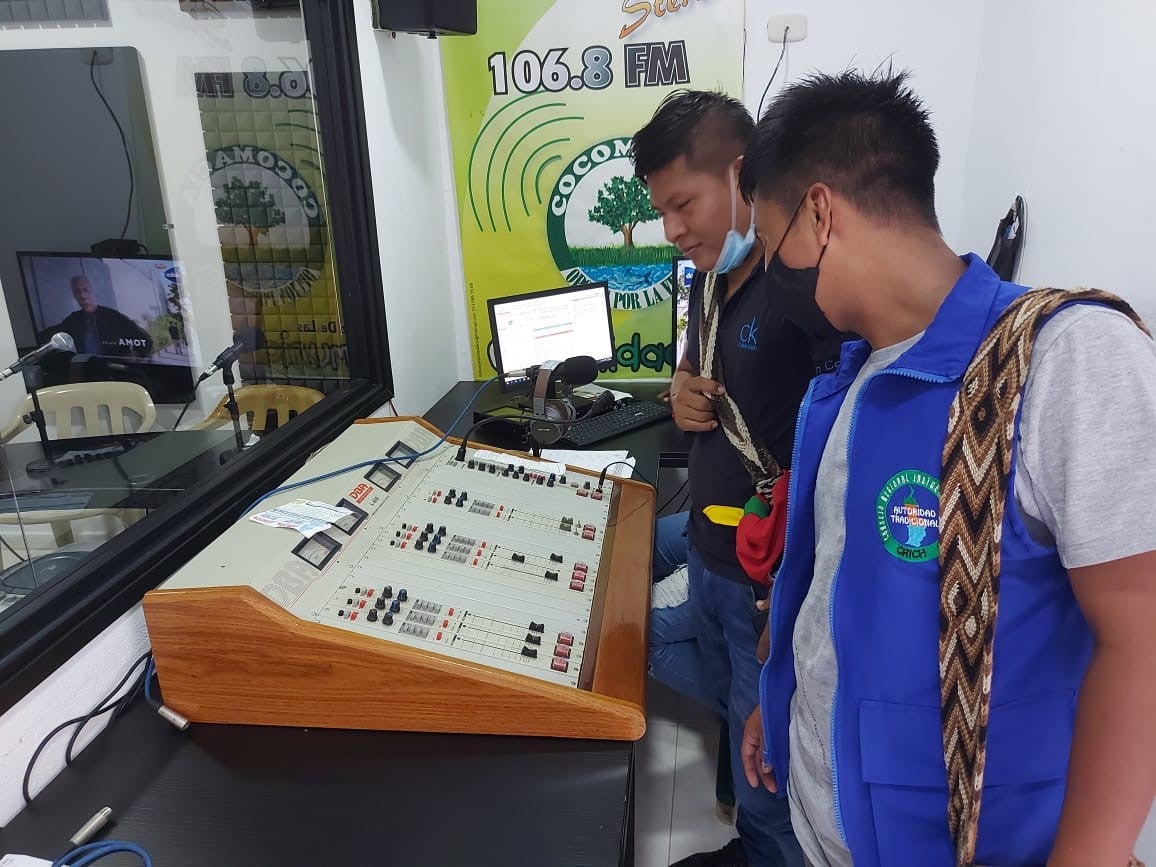
Fellow Jhon Andres Duave Serezo with youth viewing radio console. Photo courtesy of Choco Regional Indigenous Council (CRICH).
Angy Paola Conde Conchave (Embera Dovida), 23, and Jhon Andres Duave Serezo (Embera Katio), 21, have launched a fellowship project, “The Resistance and Peacebuilding of Indigenous Women from the Territory,” which provides training in production and post-production for community radio stations. They are also organizing an exchange with Indigenous organizations working in community radio. In recent weeks Jhon and two Embera Katio youth received training in community radio, followed by a production and post-production training session, and were able to put their skills into practice. They will continue to receive training in communications skills, content production, and other mechanisms used in community radio.
In these workshops, the fellows and three additional youth, members of Choco Regional Indigenous Council (CRICH) received training in digital radio stations, setting up a radio studio, creating radio programs, developing voiceovers, as well as best practices in social media and other new trends in community radio. They also learned new skills in website building and management. For the Choco Regional Indigenous Council (CRICH), this was of utmost importance since an external person had managed their before the training and now they have in-house capacity in radio production, radio program, and broadcasting. The trainings supported CRICH in their reporting on the situations of Indigenous communities of the Choco.
“We are very grateful to Cultural Survival because thanks to the financial support received, the youth who are part of the CRICH communication process have been empowered with new knowledge that will serve the Choco Regional Indigenous Council as an organizational process, and also for personal, professional, and community growth of the Indigenous Peoples they represent.”— a youth participant from the workshop.
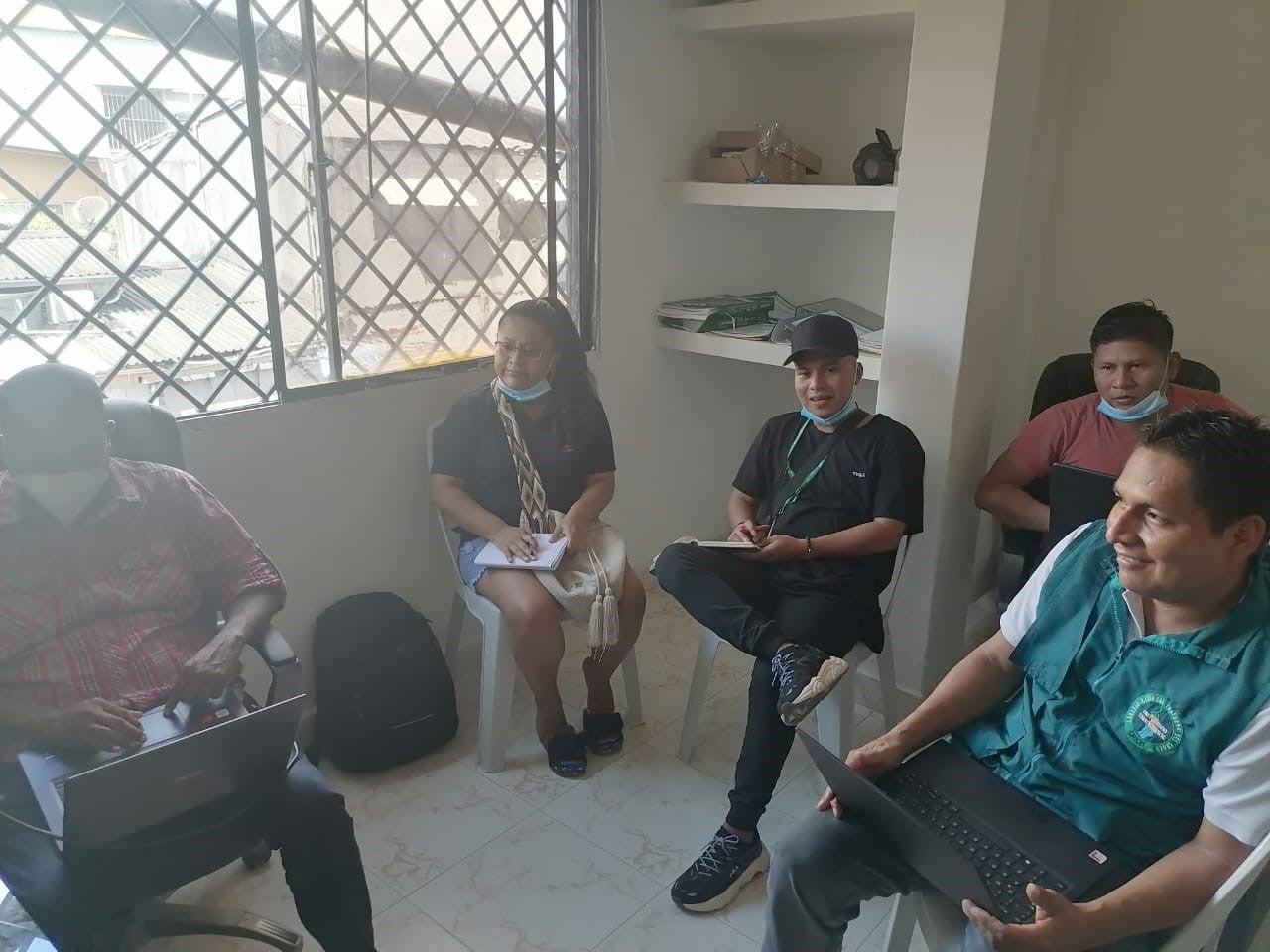
Youth receiving training. Photo courtesy of Choco Regional Indigenous Council (CRICH).
Juan Apóstol Caamal Pech (Maya Yucatan) from Mexico
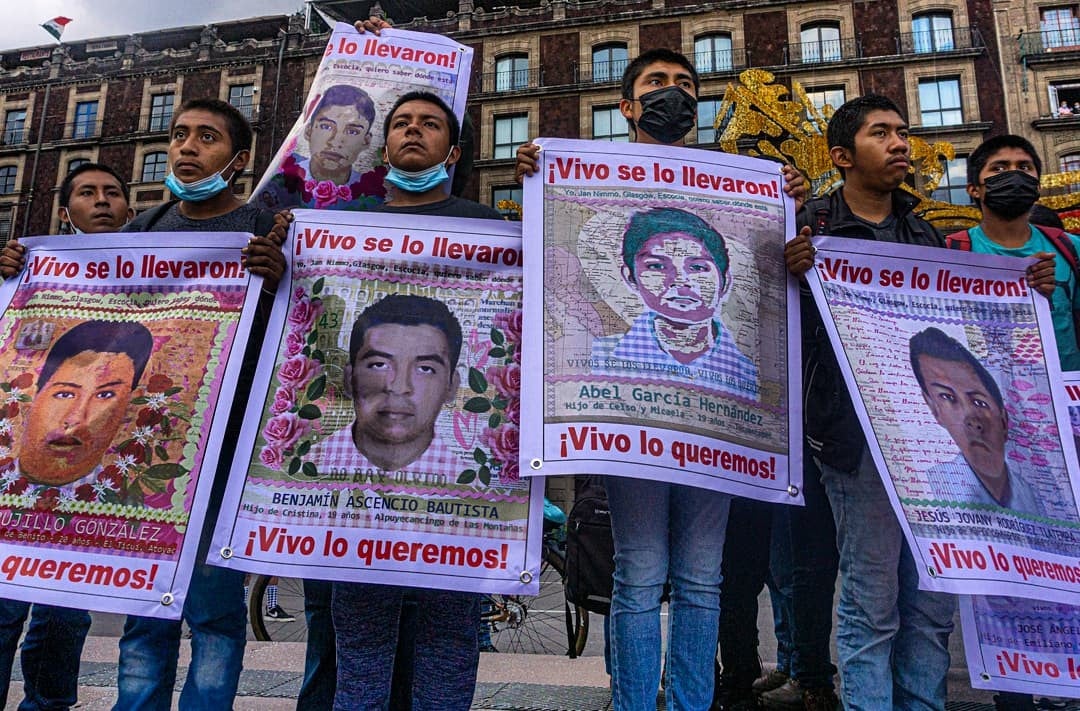
Indigenous members of the Zapatista National Liberation Army gathering for 43 missing Ayotzinapa students in Vienna, Austria. Courtesy photo Juan Apóstol Caamal Pech.
Juan Apóstol Caamal Pech (Maya Yucatan), 24, is carrying out his fellowship project, “Its’atil,” which is about the vast knowledge corn Peoples hold. Juan is creating digital magazines and organizing eight workshops for two Maya communities in the Yucatan to increase their access to education and health from a Maya perspective. Juan has been participating in political events shedding light on Mayan struggle through social media coverage.
On September 13, 2021, 177 delegates of the Zapatista National Liberation Army (EZLN) from Chiapas traveled to Vienna, Austria to raise awareness about the struggles of Indigenous Peoples. Juan is one of the delegates attending by providing media coverage. There have been public demonstrations such as a climate change rally where over 20,000 people attended. In Maya communities, people have harvested biodiverse corn over thousands of years, but the agricultural policies in Mexico are focused on increasing monoculture plantations. Demonstrating the resistance in different places to build solidarity is important to encourage Maya communities to continue their traditional practices of cultivating diverse corn. A march was also held against the extraction of natural resources that is violating the rights of Indigenous communities and causing the deaths of hundreds of Indigenous land defenders.
Juan also covered a public gathering held for the 43 Ayotzinapa students that were kidnapped and disappeared in the state of Guerrero Mexico on September 26, 2014, whose families are still seeking justice.
On September 28, 2021, in Mexico, Indigenous and non-Indigenous women demonstrated for reproductive rights. In Indigenous communities, reproductive rights are often not addressed and are even taboo in some Mayan communities of the peninsula. Its'atil published images of the demonstration to uplift the voices of women whose voices are often silenced.
See some of Juan’s work on facebook covering these events here:
Zapatista National Liberation Army travel to Vienna September 13, 2021
Reproductive rights demonstration September 28, 2021
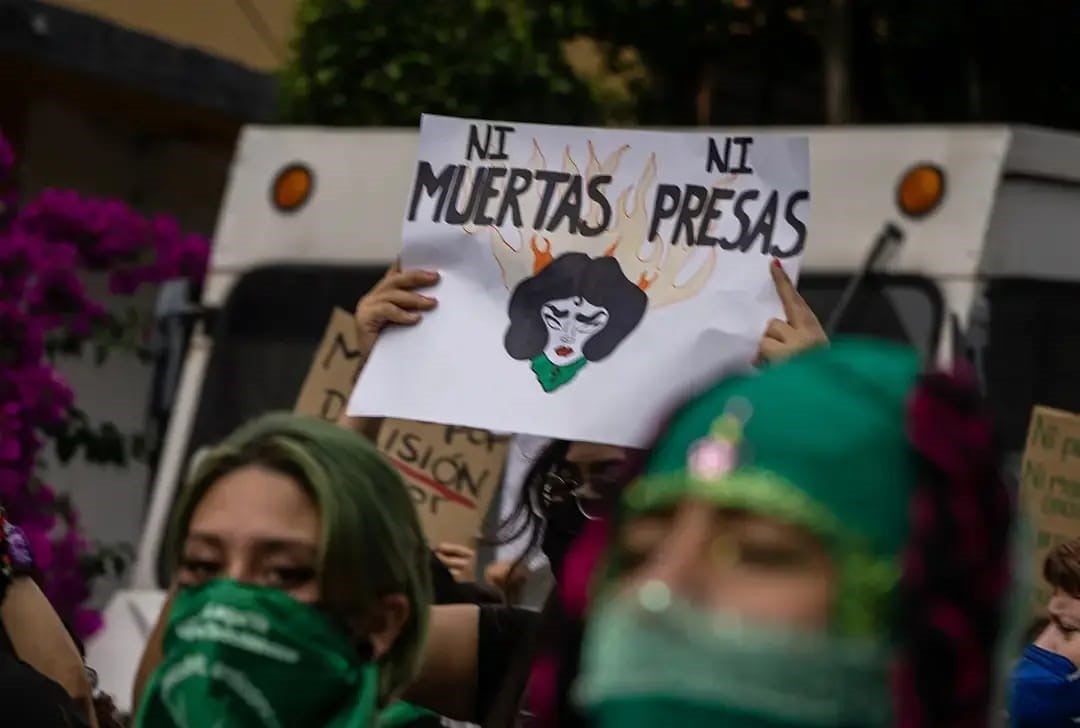
Indigenous members of the Zapatista National Liberation Army gathering for 43 missing Ayotzinapa students in Vienna, Austria. Courtesy photo Juan Apóstol Caamal Pech.
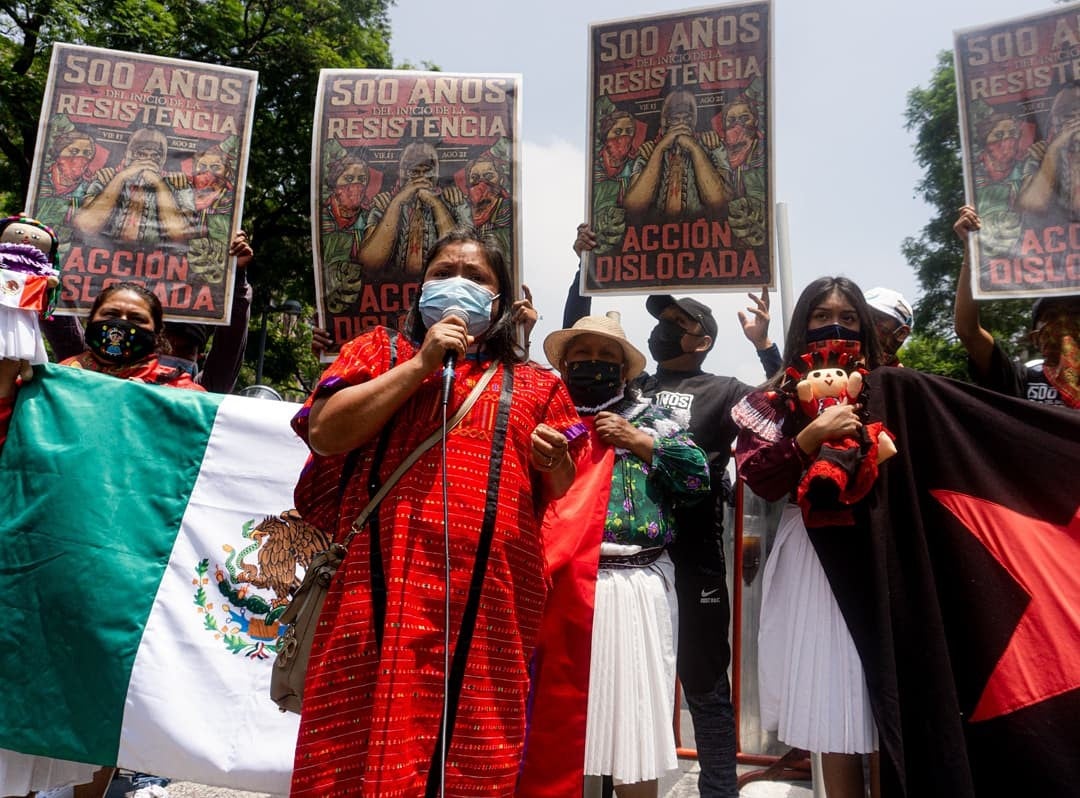
Reproductive rights demonstration September 28, 2021 in Mexico. Courtesy photo by Juan Apóstol Caamal Pech.
Cultural Survival’s Indigenous Community Media Fellowship Program supports young Indigenous leaders between the ages of 18-25, who are eager to learn about technology, program development, journalism, community radio, media, and Indigenous Peoples’ rights advocacy. This is the third year of the Fellowship Program, which has awarded grants to 33 youth to date. The capacity of the fellows is built through training, community radio station exchanges, and conference attendance.
This fellowship is an opportunity to assist fellows to represent the voices of their communities and bring awareness of local issues to global conversations through their proposed projects, all the while strengthening their cultural identities and leadership.
